新概念第一册_L55-L56课件
合集下载
新概念英语第一册55-56-PPT课件

What do they usually do?
In the morning...... At noon...... In the afternoon...... In the evening...... At night......
Homework
Talk about your family
breakfast supper/dinner
The eating habits of Americans
美国人的饮食习惯
Breakfast
Breakfast time, the general in 8:00 They always eat baked bread, cereal and coffee,
3. At noon, who always eats lunch at home? Mr. or Mrs. Sawyer?
Mrs. Sawyer.
4. In the afternoon, what does Mrs. Sawyer usually do? What do they often do? She usually sees her friends. They often drink tea together.
到达……( 大地方) 到达……(小地方)
My father will arrive __i_n_ London tomorrow. I often arrive __/__home early in the evening.
Let’s read and remember the new words:
his wife watch television.
do one's homework 做作业
最新新概念第一册55--56课课件
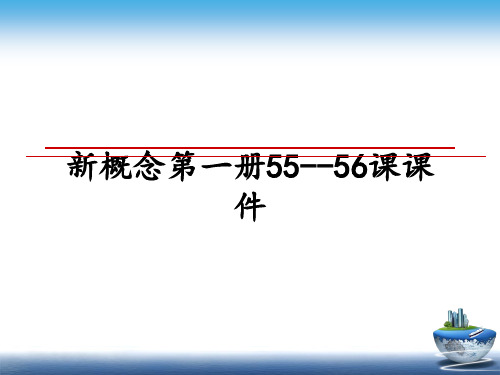
新概念第一册55--56课课 件
Say something about your family
• Where are you from? • How many people are there in your family? • Who are they? • How old is your father/mother ? • What does your father/mother do? • What do you do after school everyday? • What do your parents do after work everyday?
I often have / eat lunch at 12:30.
afternoon 下午;在下午
in the afternoon
evening 晚上, 在晚上
in the evening 是在傍晚(晚上6点左右)
night 夜晚, 在夜晚
at night 在深夜(通常11点左右) at noon 在正午
• The Sawyers live at 87 King Street. • The children go to school • Sometimes he and his wife watch TV.
• Mr. Sawyer goes to work in the morning. • He arrives home late. • she usually sees her friends in the afternoon.
What about Mr. Sawyer?
1
The Sawyers live at 87 King Street.
2
In the morning, Mr. Sawyer goes to work and the children go to school. Their father takes them to school every day.
Say something about your family
• Where are you from? • How many people are there in your family? • Who are they? • How old is your father/mother ? • What does your father/mother do? • What do you do after school everyday? • What do your parents do after work everyday?
I often have / eat lunch at 12:30.
afternoon 下午;在下午
in the afternoon
evening 晚上, 在晚上
in the evening 是在傍晚(晚上6点左右)
night 夜晚, 在夜晚
at night 在深夜(通常11点左右) at noon 在正午
• The Sawyers live at 87 King Street. • The children go to school • Sometimes he and his wife watch TV.
• Mr. Sawyer goes to work in the morning. • He arrives home late. • she usually sees her friends in the afternoon.
What about Mr. Sawyer?
1
The Sawyers live at 87 King Street.
2
In the morning, Mr. Sawyer goes to work and the children go to school. Their father takes them to school every day.
新概念英语第一册第55-56课件(共25张PPT)
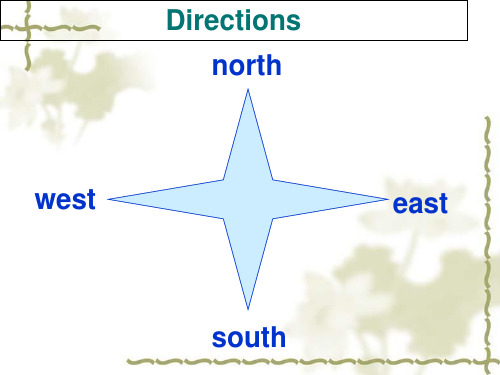
要加-s
表述客观规律或事实用一般现在时
The plane can fly in the sky. The earth goes around the sun. The book is yellow. He is tall. He is very smart! She is very beautiful!
谢谢观赏
You made my day!
我们,还在路上……
What do you usually do in the weekend? in your vacation?
Do some exercises: 1. ( c ) I often _____ up at 7:oo in the morning. My mother often
_____up at 6:30. A. get, get B. gets, gets C. get, gets D. gets, get 2. (B )Jim’s brother ____ in a factory. He usually _____ to work by car. A. work, go B. works, goes C. works, go D. work, goes 3. (A) ____ you always ____ basketball on Sundays? A. Do, play B. Does, play C. Are, playing D. Are, play 4. (D) _____ your father often____ TV in the evening?
Does she often do her homework at night?
Lesson 56 What do they usually do?
表述客观规律或事实用一般现在时
The plane can fly in the sky. The earth goes around the sun. The book is yellow. He is tall. He is very smart! She is very beautiful!
谢谢观赏
You made my day!
我们,还在路上……
What do you usually do in the weekend? in your vacation?
Do some exercises: 1. ( c ) I often _____ up at 7:oo in the morning. My mother often
_____up at 6:30. A. get, get B. gets, gets C. get, gets D. gets, get 2. (B )Jim’s brother ____ in a factory. He usually _____ to work by car. A. work, go B. works, goes C. works, go D. work, goes 3. (A) ____ you always ____ basketball on Sundays? A. Do, play B. Does, play C. Are, playing D. Are, play 4. (D) _____ your father often____ TV in the evening?
Does she often do her homework at night?
Lesson 56 What do they usually do?
新概念一册L55-L56课课件

usually adv. 通常
频率副词:指经常发生的习惯性的动作,与一般现在时连用 always总是 usually通常 often经常 sometimes有时 never从不
eg:你下午经常干什么?我经常玩电脑 -What do you usually do in the afternoon? -I usually play computer.
Mrs. Sawyer stays at home every day. She does the housework.
1.the Sawyers是指索耶一家人,在英文中,姓氏后面加-s,前面加定冠词the,用来指一家人 2.live at…住在…(后接小的地点)live in…住在…(大地点) 3.in the morning在上午 in the afternoon/ evening在下午/晚上 at noon在中午 at night在晚上 4.go to work 去上班 go to school去上学 5.take sb.(某人)to sp.(某地)---这里的sb.用人称代词宾格(me/us/you/him/her/it/them) 6.stay at home待在家 7.do the housework做家务
At night, the children always do their homework. Then they go to bed. Mr. Sawyer usually reads his newspaper, but sometimes he and his wife watch television.
hometown家乡 homework家庭作业
housework n.家务(不可数名词)
• do the housework 做家务 • eg:我妈妈每天做家务。
新概念英语一册第55-56课件

adv. 在上午 adv. 在下午 adv. 在晚上
• at •
noon night
adv. 正午时 adv. 在夜里
Listen with Questions!
• When does Mrs. Sawyer eat her lunch? She eats her lunch at noon. • Who takes children to school every day? Their father takes them to school every day. • When do the children do their homework? The children always do their homework at night. • What does Mr. Sawyer do after he go to bed?
• 这些地点副词前面不能加介词:here,there, home,upstairs,downstairs,downtown,abroad
一般现在时
• 描述经常出现的动作,或经常存在的状态 • 常配副词:usually, often, sometimes • 常用时间状语:
• Work in pairs, and make a dialogue based on pictures of P111
• the + 姓氏s = 某某一家人 • the Smiths = 史密斯一家 • the Johnsons = 约翰逊一家
live in King Street live in Beijing
• go to school 去上学 go to work 去上班 • goes: “go”的第三人称单数形式
guess→guesses teach→teaches fix→fixes wash→washes do→does
最新新概念第一册第55-56课课件精品课件
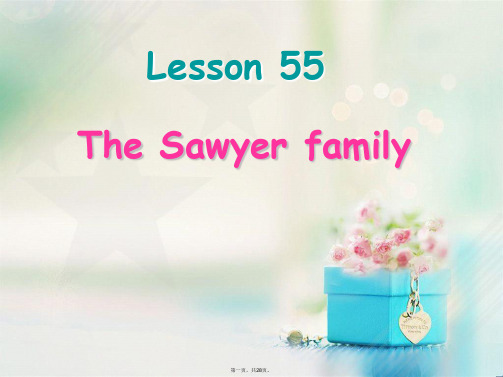
stays at home, does the housework
eats her lunch
sees her friends, drink tea together
come home from school, arrive home early
comes home from work,
arrives home late
将下列方框(fānɡ kuànɡ)中介词填到下面的题目中。
in, at, to, from
My
uncle the
stays ____ evening.
home
in
thaet
day
and
goes
to
work
___
He goes _____ work early and heincomes home ____ work
第三页,共28页。
[ 'iːvnɪŋ ]
[ lʌntʃ ]
[ naɪt ]
第四页,共28页。
lunch
午饭(wǔfàn)
evening
晚上(wǎn shang)
第五页,共28页。
live 住;生活(shēnghuó); 直播
The Sawyers live at 87 King Street.
第十六页,共28页。
写出下列动词的第三人称单数(dānshù)形式:
see__s_e_es give___g_iv_eslive____livewsatch_____
do____wawtachlke_s____dowesant____ wgaolk_s_____
shine_____ play_______
Lesson 55
eats her lunch
sees her friends, drink tea together
come home from school, arrive home early
comes home from work,
arrives home late
将下列方框(fānɡ kuànɡ)中介词填到下面的题目中。
in, at, to, from
My
uncle the
stays ____ evening.
home
in
thaet
day
and
goes
to
work
___
He goes _____ work early and heincomes home ____ work
第三页,共28页。
[ 'iːvnɪŋ ]
[ lʌntʃ ]
[ naɪt ]
第四页,共28页。
lunch
午饭(wǔfàn)
evening
晚上(wǎn shang)
第五页,共28页。
live 住;生活(shēnghuó); 直播
The Sawyers live at 87 King Street.
第十六页,共28页。
写出下列动词的第三人称单数(dānshù)形式:
see__s_e_es give___g_iv_eslive____livewsatch_____
do____wawtachlke_s____dowesant____ wgaolk_s_____
shine_____ play_______
Lesson 55
新概念第一册 L55-L56课件

Warming Up
Lesson55 The Sawyar FamilyFra bibliotek教学重难点
• 知识目标: 1.知记本课的单词和词组 2.掌握一般现在时态的时间状语 3.掌握句式What does\do ually do? • 能力目标: 能够理解并且会应用一般现在时 情感目标: 通过介绍自己的家庭成员和工作,进一步 加深和家人的情感沟通!
一般现在时常与以下时间状语连用:always, usually , regularly 有规律的, every morning/night/evening/day/week/year , often, sometimes , from time to time有时候, twice a week, rarely罕有的 , seldom很少,不常, once a month, hardly, ever永远 , never
• Take sb to someplace. Eg: He takes his son to school.
• arrive是不及物 是不及物 动词, 动词,在它后面 不可以直接跟名 词作为宾语, 词作为宾语, • 如:arrive at a village arrive in Shanghai
句 式
重 点
1表示经常的或习惯性的动作,常与表示频度的时 间状语连用。 2.表示主语具备的性格、能力和特征。 3.表示现在的状态。 4.表示客观事实和普遍真理。 4. 5.在时间状语从句和条件状语从句中,常用一般现 在时代替将来时。 6.表示预先计划或安排好的行为。 7.小说故事用一般现在时代替一般过去时。
Bye
bye !
See you next time!
1我们每天七点钟上学。 2.你平时周末做什么呢?我通常去会会朋友。 3.我家住在高新区紫瑞大道188号。 4.高小姐教英语。 5.我父亲起得很早。 6.我们非常喜欢英语。 7. 7.他常常步行去上学。 8.雪莉有时去游泳。 9.她学英语吗? 10.他是做什么工作的? 11.他不在家里做作业。 12.我们星期天不去学校。 13.他经常十点钟睡觉。 14.有时我五点起床。 15.我们通常周日去购物。
Lesson55 The Sawyar FamilyFra bibliotek教学重难点
• 知识目标: 1.知记本课的单词和词组 2.掌握一般现在时态的时间状语 3.掌握句式What does\do ually do? • 能力目标: 能够理解并且会应用一般现在时 情感目标: 通过介绍自己的家庭成员和工作,进一步 加深和家人的情感沟通!
一般现在时常与以下时间状语连用:always, usually , regularly 有规律的, every morning/night/evening/day/week/year , often, sometimes , from time to time有时候, twice a week, rarely罕有的 , seldom很少,不常, once a month, hardly, ever永远 , never
• Take sb to someplace. Eg: He takes his son to school.
• arrive是不及物 是不及物 动词, 动词,在它后面 不可以直接跟名 词作为宾语, 词作为宾语, • 如:arrive at a village arrive in Shanghai
句 式
重 点
1表示经常的或习惯性的动作,常与表示频度的时 间状语连用。 2.表示主语具备的性格、能力和特征。 3.表示现在的状态。 4.表示客观事实和普遍真理。 4. 5.在时间状语从句和条件状语从句中,常用一般现 在时代替将来时。 6.表示预先计划或安排好的行为。 7.小说故事用一般现在时代替一般过去时。
Bye
bye !
See you next time!
1我们每天七点钟上学。 2.你平时周末做什么呢?我通常去会会朋友。 3.我家住在高新区紫瑞大道188号。 4.高小姐教英语。 5.我父亲起得很早。 6.我们非常喜欢英语。 7. 7.他常常步行去上学。 8.雪莉有时去游泳。 9.她学英语吗? 10.他是做什么工作的? 11.他不在家里做作业。 12.我们星期天不去学校。 13.他经常十点钟睡觉。 14.有时我五点起床。 15.我们通常周日去购物。
新概念第一册第55-56课课件PPT课件

comes home from work, arrives home late
At night
the children Mr. Sawyer
do their homework, go to bed reads his newspaper
Mr. Sawyer and
watch television
his wife 第22页/共28页
第21页/共28页
When In the morning
Who
Mr. Sawyer
the children
Mrs. Sawyer
At noon
In the afternoon
Mrs. Sawyer Mrs. Sawyer
In the evening
the children Mr. Sawyer
What
第12页/共28页
• ①stop-stops [s] ; make-makes [s] • ②read-reads [z] ; play-plays [z] • 1.大多数动词在词尾加“s”在清辅音后发音为[s],在浊辅音及元音后发音为 [z]。
第13页/共28页
• fly-flies [iz]; carry-carries [iz] • study-studies [iz]; worry-worries [iz] • 2、以辅音字母加“y”结尾的,要先将“y”变为“i”,然后再加“es”读[iz]
➢频率副词 often, usually, sometimes, always
第18页/共28页
主谓结构
主语不是单三: 主语+实义动词原形
主语是第三人称单数:
主语+实义动词单三形式
1.一般动词末尾直接加-s
At night
the children Mr. Sawyer
do their homework, go to bed reads his newspaper
Mr. Sawyer and
watch television
his wife 第22页/共28页
第21页/共28页
When In the morning
Who
Mr. Sawyer
the children
Mrs. Sawyer
At noon
In the afternoon
Mrs. Sawyer Mrs. Sawyer
In the evening
the children Mr. Sawyer
What
第12页/共28页
• ①stop-stops [s] ; make-makes [s] • ②read-reads [z] ; play-plays [z] • 1.大多数动词在词尾加“s”在清辅音后发音为[s],在浊辅音及元音后发音为 [z]。
第13页/共28页
• fly-flies [iz]; carry-carries [iz] • study-studies [iz]; worry-worries [iz] • 2、以辅音字母加“y”结尾的,要先将“y”变为“i”,然后再加“es”读[iz]
➢频率副词 often, usually, sometimes, always
第18页/共28页
主谓结构
主语不是单三: 主语+实义动词原形
主语是第三人称单数:
主语+实义动词单三形式
1.一般动词末尾直接加-s
新概念英语第一册_55_56课课件

together adv. 一起
eg :My best friend and I live together. eg :We sometimes drink coffee together.
evening n. 晚上
一般指下午以后和上床睡觉前 这段时间比night的时间要早。 night 一般指夜里
night n. 夜间
good night 晚安 at night 在夜里 all night along 一整夜
arrive v. 到达
arrive in 后面一般接城市或国家 arrive in France arrive 后面可直接加副词 arrive here arrive there arrive home arrive at 后面接的地点,一 般是公共场所或某座大楼。 arrive at the hotel
sework n. 家务 h n. 午饭 ernoon n. 下午
usually adv. 通常 together adv. 一起 evening n. 晚上 arrive v. 到达 night n. 夜间
live v. 住,生活(是指长久的居住,住在自己家中)
eg: where do you live ? 你住在哪里?
reads her
milk
eats her lunch newspaper
Bye---bye!
知识回顾 Knowledge Review
—I usually play on the computer.
dusts the makes the cupboard bed
shaves
listen
cleans the go to bed blackboard
eg :My best friend and I live together. eg :We sometimes drink coffee together.
evening n. 晚上
一般指下午以后和上床睡觉前 这段时间比night的时间要早。 night 一般指夜里
night n. 夜间
good night 晚安 at night 在夜里 all night along 一整夜
arrive v. 到达
arrive in 后面一般接城市或国家 arrive in France arrive 后面可直接加副词 arrive here arrive there arrive home arrive at 后面接的地点,一 般是公共场所或某座大楼。 arrive at the hotel
sework n. 家务 h n. 午饭 ernoon n. 下午
usually adv. 通常 together adv. 一起 evening n. 晚上 arrive v. 到达 night n. 夜间
live v. 住,生活(是指长久的居住,住在自己家中)
eg: where do you live ? 你住在哪里?
reads her
milk
eats her lunch newspaper
Bye---bye!
知识回顾 Knowledge Review
—I usually play on the computer.
dusts the makes the cupboard bed
shaves
listen
cleans the go to bed blackboard
新概念英语第一册Lesson_55&56极品课件!

Let's retell the story!
Talk about your family!
There are three people in my family. My father is a policeman. He is 37. My mother is 35. • In the morning, I often go to school. I go to school on foot. And my father often goes to work. He goes to work by car. My mother is a housewife. She stays at home every day. She does the housework. • In the afternoon, she often goes shopping with her friends. • In the evening, I often do my homework. My father usually reads newspapers. My mother usually watches TV.
Jimmy doesn’t have lunch at home
• the morning.(对划线部分提问)
What does your father usually do in the morning? Does she often do her homework at night?
• 4.She often does her homework at night.(改一般疑问句)
a week, twice a week, three times a week, hardly, never
新概念英语第一册-55-56课课件

ຫໍສະໝຸດ Text A总结词
学习英语常用表达
详细描述
Text B包含了一些英语常用表达和句型,通过学习这些表达和句型,学生可以更好地掌握英语口语和写作技巧,提高英语应用能力。
Text B
了解英国教育体系
总结词
Text C介绍了英国的教育体系,包括小学、中学和大学的教育体制、课程设置和教学方式等,旨在帮助学生更好地了解英国的教育情况。
Vocabulary exercises
Multiple choice: Choose the correct meaning of a given word from a list of choices.
Vocabulary exercises
Lesson 56 Vocabulary Exercises
Reading exercises
Writing Practice
07
Writing guidance
Introduction
Task Description
Example
Assessment Criteria
Provide a brief overview of the writing task and its importance.
This tense is used to talk about an action that started in the past and is still continuing in the present. It is formed by using "have been" + -ing form of the verb.
提高听、说、读、写能力
本课程注重全面提高学生的英语能力,通过大量的听力、口语、阅读和写作练习,帮助学生提高英语的实际应用能力。
学习英语常用表达
详细描述
Text B包含了一些英语常用表达和句型,通过学习这些表达和句型,学生可以更好地掌握英语口语和写作技巧,提高英语应用能力。
Text B
了解英国教育体系
总结词
Text C介绍了英国的教育体系,包括小学、中学和大学的教育体制、课程设置和教学方式等,旨在帮助学生更好地了解英国的教育情况。
Vocabulary exercises
Multiple choice: Choose the correct meaning of a given word from a list of choices.
Vocabulary exercises
Lesson 56 Vocabulary Exercises
Reading exercises
Writing Practice
07
Writing guidance
Introduction
Task Description
Example
Assessment Criteria
Provide a brief overview of the writing task and its importance.
This tense is used to talk about an action that started in the past and is still continuing in the present. It is formed by using "have been" + -ing form of the verb.
提高听、说、读、写能力
本课程注重全面提高学生的英语能力,通过大量的听力、口语、阅读和写作练习,帮助学生提高英语的实际应用能力。
新概念英语第一册 Lesson55-56 课 (共19张ppt)
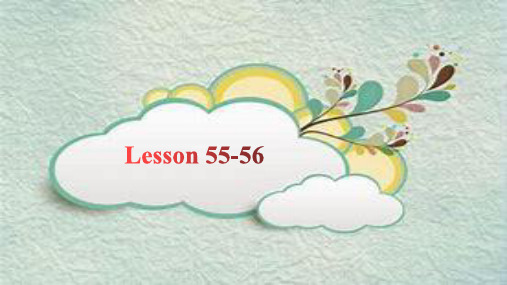
In the evening,the children come home from school. They arrive home early. Mr. Sawyer comes home from work. He arrives home late. At night ,the children always do their homework,then they go to bed. Mr.Sawyer usually reads his newspaper, but sometimes he and his wife watch television.
every day ; on Sundays…
am is are 动词原形、动词的三单形式
动词三单式
1. 一般情况词尾+s 2. s(随) sh (时) ch (出) x(现) o(哦)结尾的动词,后+es 3.以辅音字母+y结尾的词 ,先变y为i, 再+es 4.以元音字母+y结尾的词 ,直接+s
In the evening,the children come home from school. They arrive home early. Mr. Sawyer comes home from work. He arrives home late. At night ,the children always do their homework,then they go to bed. Mr.Sawyer usually reads his newspaper, but sometimes he and his wife watch television.
The Sawyers live at 87 King Street. In the morning,Mr.Sawyer goes to work and the children go to school. Their father takes them to school every day.Mrs. Sawyer stays at home every day.She does the housework. She always eats her lunch at noon. In the afternoon,she usually sees her friends. They often drink tea together.
新概念第一册_L55-L56课件

句重 式点
1表示经常的或习惯性的动作,常与表示频度的时 间状语连用。 2.表示主语具备的性格、能力和特征。 3.表示现在的状态。 4.表示客观事实和普遍真理。 5.在时间状语从句和条件状语从句中,常用一般现 在时代替将来时。 6.表示预先计划或安排好的行为。 7.小说故事用一般现在时代替一般过去时。
• Take sb to someplace. Eg: He takes his son to school.
• arrive是不及物 动词,在它后面 不可以直接跟名 词作为宾语, • 如:arrive at a village arrive in Shanghai
• The Sawyers live at 87 King Street. In the morning, Mr. Sawyer goes to work and the children go to school. Their father takes them to school every day. Mrs. Sawyer stays at home every day. She does the housework. She always eats her lunch at noon. In the afternoon, she usually sees her friends. They often drink tea together. In the evening, the children come home from school. They arrive home early. Mr. Sawyer comes home from work. He arrives home late. At night, the children always do their homework. Then they go to bed. Mr. Sawyer usually reads his newspaper, but sometimes he and his wife watch television.
新概念英语NCE1_Lesson55-56(共23页)课件
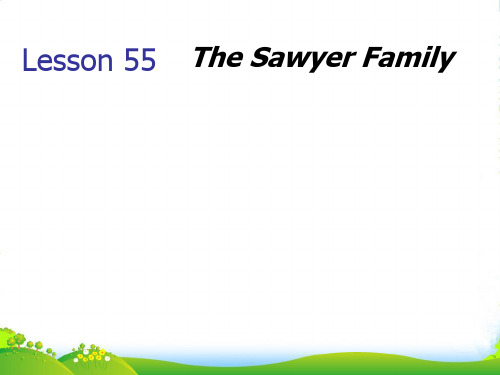
I live 56 Deng Zhou Rd.
9、阅读使人充实,会谈使人敏捷,写作与笔记使人精确……史鉴使人明智;诗歌使人巧慧2021/9/252021/9/25Saturday, September 25, 2021 10、每一本书是一级小阶梯,我每爬上一级,就更脱离畜生而上升到人类,更接近美好生活的观念,更热爱书籍。2021/9/252021/9/252021/9/259/25/2021 9:15:36 PM 11、书是人类进步的阶梯,终生的伴侣,最诚挚的朋友。2021/9/252021/9/252021/9/25Sep-2125-Sep-21 12、阅读一本不适合自己阅读的书,比不阅读还要坏。我们必须会这样一种本领,选择最有价值、最适合自己所需要的读物。2021/9/252021/9/252021/9/25Saturday, September 25, 2021 13、He who seize the right moment, is the right man.谁把握机遇,谁就心想事成。2021/9/252021/9/252021/9/252021/9/259/25/2021 14、谁要是自己还没有发展培养和教育好,他就不能发展培养和教育别人。2021年9月25日星期六2021/9/252021/9/252021/9/25 15、一个爱书的人,他必定不致缺少一个忠实的朋友,一个良好的老师,一个可爱的伴侣,一个优婉的安慰者。2021年9月2021/9/252021/9/252021/9/259/25/2021 16、提出一个问题往往比解决一个更重要。因为解决问题也许仅是一个数学上或实验上的技能而已,而提出新的问题,却需要有创造性的想像力,而且标志着科学的真正进步。 2021/9/252021/9/25September 25, 2021 17、看文字须大段精彩看,耸起精神,竖起筋骨,不要困,如有刀剑在后一般。就一段中须要透;击其首则尾应,击其尾则首应,方始是。不可按册子便在,掩了册子便忘。 2021/9/252021/9/252021/9/252021/9/25
- 1、下载文档前请自行甄别文档内容的完整性,平台不提供额外的编辑、内容补充、找答案等附加服务。
- 2、"仅部分预览"的文档,不可在线预览部分如存在完整性等问题,可反馈申请退款(可完整预览的文档不适用该条件!)。
- 3、如文档侵犯您的权益,请联系客服反馈,我们会尽快为您处理(人工客服工作时间:9:00-18:30)。
一般现在时常与以下时间状语连用:always, usually , regularly 有规律的, every morning/night/evening/day/week/year , often, sometimes , from time to time有时候, twice a week, rarely罕有的 , seldom很少,不常, once a month, hardly, ever永远 , never
• Take sb to someplace. Eg: He takes his son to school.
• arrive是不及物 是不及物 动词, 动词,在它后面 不可以直接跟名 词作为宾语, 词作为宾语, • 如:arrive at a village arrive in S习惯性的动作,常与表示频度的时 间状语连用。 2.表示主语具备的性格、能力和特征。 3.表示现在的状态。 4.表示客观事实和普遍真理。 5.在时间状语从句和条件状语从句中,常用一般现 在时代替将来时。 6.表示预先计划或安排好的行为。 7.小说故事用一般现在时代替一般过去时。
Bye
bye !
See you next time!
Lesson55 The Sawyar Family
在姓氏后加s,前面加上定冠词 在姓氏后加 ,前面加上定冠词the, , 表示某某一家人, 表示某某一家人,如:the Smiths
表达地址时,在具体的门牌号前要用 表达地址时,在具体的门牌号前要用at, 在城市或者街名前要用in 在城市或者街名前要用 如:They live at 87 king street. They live in king street. They live in Chengdu.
